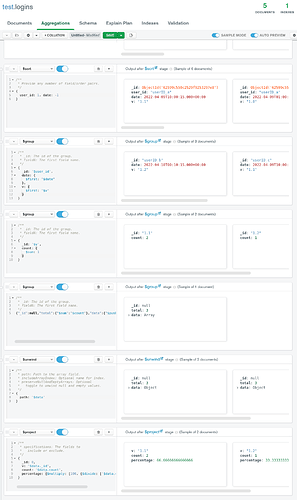Hi @Zhihong_GUO,
Here is my solution in Python:
from datetime import datetime
from pymongo import MongoClient, ASCENDING, DESCENDING
client = MongoClient()
db = client.get_database('test')
logins = db.get_collection('logins')
logins.drop()
logins.create_index([('user_id', ASCENDING), ('date', DESCENDING), ('v', ASCENDING)])
logins.insert_many([
{'user_id': 'userID_a', 'date': datetime.strptime('2022-04-08T00:00:15Z', '%Y-%m-%dT%H:%M:%SZ'), 'v': '1.0'},
{'user_id': 'userID_b', 'date': datetime.strptime('2022-04-08T00:10:15Z', '%Y-%m-%dT%H:%M:%SZ'), 'v': '1.1'},
{'user_id': 'userID_a', 'date': datetime.strptime('2022-04-09T01:00:15Z', '%Y-%m-%dT%H:%M:%SZ'), 'v': '1.0'},
{'user_id': 'userID_b', 'date': datetime.strptime('2022-04-10T00:10:15Z', '%Y-%m-%dT%H:%M:%SZ'), 'v': '1.2'},
{'user_id': 'userID_a', 'date': datetime.strptime('2022-04-09T10:00:15Z', '%Y-%m-%dT%H:%M:%SZ'), 'v': '1.1'},
{'user_id': 'userID_c', 'date': datetime.strptime('2022-04-09T10:00:15Z', '%Y-%m-%dT%H:%M:%SZ'), 'v': '1.1'}
])
pipeline = [
{
'$sort': {
'user_id': 1,
'date': -1
}
}, {
'$group': {
'_id': '$user_id',
'date': {
'$first': '$date'
},
'v': {
'$first': '$v'
}
}
}, {
'$group': {
'_id': '$v',
'count': {
'$sum': 1
}
}
}, {
'$group': {
'_id': None,
'total': {
'$sum': '$count'
},
'data': {
'$push': '$$ROOT'
}
}
}, {
'$unwind': {
'path': '$data'
}
}, {
'$project': {
'_id': 0,
'v': '$data._id',
'count': '$data.count',
'percentage': {
'$multiply': [
100, {
'$divide': [
'$data.count', '$total'
]
}
]
}
}
}
]
results = logins.aggregate(pipeline)
for r in results:
print(r)
Results (I added an extra user_id ‘userID_c’ so it’s not 50/50):
{'v': '1.2', 'count': 1, 'percentage': 33.33333333333333}
{'v': '1.1', 'count': 2, 'percentage': 66.66666666666666}
Here is my aggregation pipeline:
[
{
'$sort': {
'user_id': 1,
'date': -1
}
}, {
'$group': {
'_id': '$user_id',
'date': {
'$first': '$date'
},
'v': {
'$first': '$v'
}
}
}, {
'$group': {
'_id': '$v',
'count': {
'$sum': 1
}
}
}, {
'$group': {
'_id': null,
'total': {
'$sum': '$count'
},
'data': {
'$push': '$$ROOT'
}
}
}, {
'$unwind': {
'path': '$data'
}
}, {
'$project': {
'_id': 0,
'v': '$data._id',
'count': '$data.count',
'percentage': {
'$multiply': [
100, {
'$divide': [
'$data.count', '$total'
]
}
]
}
}
}
]
It looks like this in MongoDB Compass with the step by step on the side:
EDIT: Oh and note that I’m using the index {user_id: 1, date: -1, v: 1} which should support this query according to this doc.
Cheers,
Maxime.
